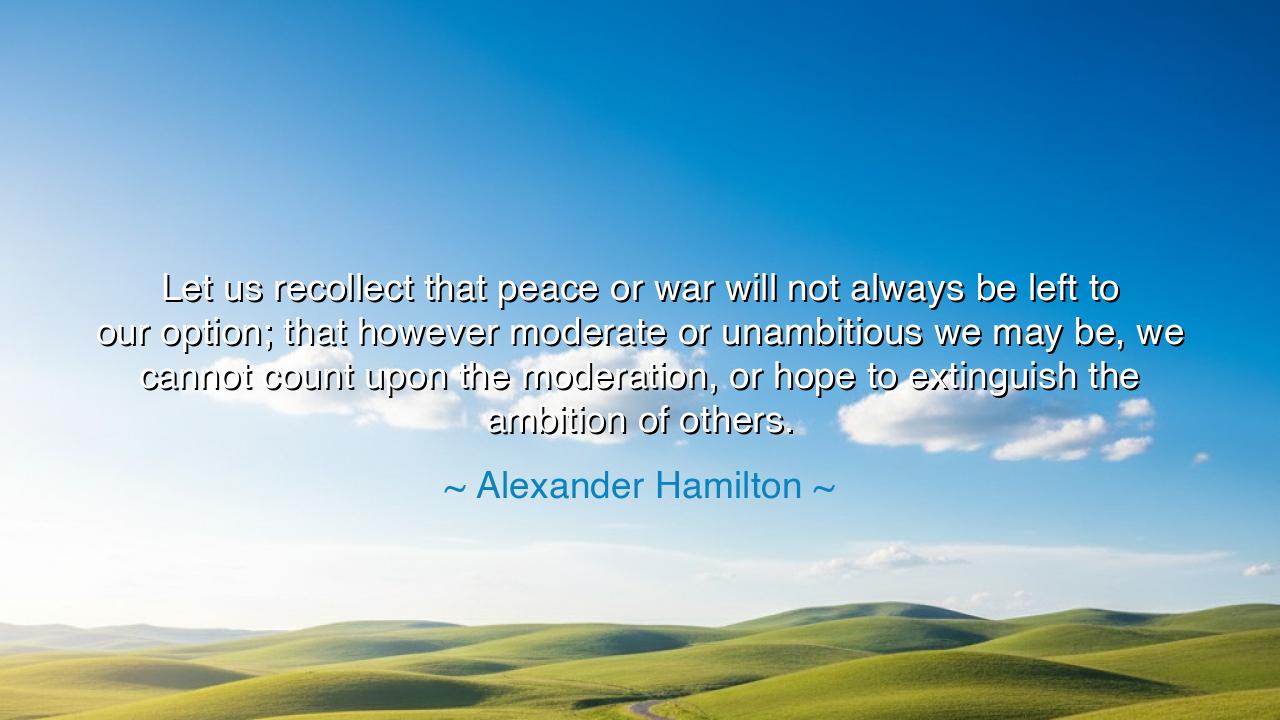
Let us recollect that peace or war will not always be left to our
Let us recollect that peace or war will not always be left to our option; that however moderate or unambitious we may be, we cannot count upon the moderation, or hope to extinguish the ambition of others.






“Let us recollect that peace or war will not always be left to our option; that however moderate or unambitious we may be, we cannot count upon the moderation, or hope to extinguish the ambition of others.” Thus spoke Alexander Hamilton, one of the founding architects of the American republic, a man whose vision was as fierce as his intellect was sharp. In these words, drawn from the wisdom of struggle and the observation of human nature, Hamilton reminds us of an eternal truth: that peace is never guaranteed, and that our own restraint cannot always protect us from the ambition and aggression of others. His voice rises like that of a sentinel warning a sleeping city—do not believe that your safety lies solely in your virtue, for the world is filled with forces that do not share it.
The origin of these words lies in the tumultuous years following the birth of the United States. The young nation, fresh from revolution, was weary of war and longed for peace. Many believed that by maintaining modesty, neutrality, and goodwill, the country could avoid further conflict. But Hamilton, ever the realist, saw deeper. He understood that human nature is not tamed by treaties or pacified by moral intentions. There will always be those driven by greed, envy, or conquest—nations and individuals alike—who see in another’s peace an opportunity for power. Thus he warned: even if we ourselves are moderate and unambitious, we must not presume upon the virtue of others.
This wisdom is not limited to politics—it is the condition of all human affairs. The ancients knew this well. The philosopher Thucydides, writing of the Peloponnesian War, declared that the strong do what they will and the weak suffer what they must. It is not cynicism, but understanding. Peace is a treasure that must be guarded as well as desired, for without vigilance, peace invites violation. Just as a house left unfortified tempts the thief, so too does a nation unprepared for conflict tempt the ambitions of its rivals. Hamilton’s words echo through time: to preserve peace, one must prepare for the possibility of war.
Consider the fate of Rome, that great and mighty republic. In its early centuries, it sought only to defend its borders, to live modestly among neighboring tribes. But in time, the ambition of others—Gauls, Carthaginians, and kings—forced Rome to arm itself. Through struggle, it became powerful; through vigilance, it endured. Yet even Rome, when it grew complacent and divided, fell prey to new barbarians who sought what it had built. History thus proves Hamilton’s warning: peace is not preserved by desire alone, but by strength, unity, and foresight.
Hamilton himself lived and died by this truth. In the age of Washington, he worked tirelessly to strengthen the nation’s defenses, to build a navy, to establish a treasury capable of sustaining the young republic in times of crisis. He was not a man of idle dreams, but of preparation and resolve. His realism was not born of fear, but of faith—that the peace worth preserving must be fortified by wisdom and readiness. To him, moderation without vigilance was naïveté, and goodwill without strength was invitation to danger.
His words also bear moral weight beyond the battlefield. In our personal lives, too, we cannot rely solely on our own gentleness or good intentions to ensure harmony. There will always be those whose envy, misunderstanding, or ambition disturbs our peace. To be wise, then, is to be both kind and guarded—to cultivate the inner strength that allows for forgiveness, yet the discernment that prevents exploitation. Peace, whether of nations or souls, must be actively maintained. It is not the absence of conflict, but the mastery of it.
So, my listener, take this teaching to heart: do not mistake moderation for safety, nor kindness for protection. The world, though capable of beauty, is also shaped by struggle. Therefore, let your mind be gentle, but your will be firm. Seek peace, but prepare your defenses—be they of courage, wisdom, or strength of character. For to love peace truly, you must be willing to guard it.
Thus, remember the wisdom of Alexander Hamilton: that peace is a garden which grows only under the watchful care of those who understand the nature of mankind. Hope for the best, but be ready for the worst. Do not surrender your vigilance to the illusion of security, nor your strength to the comfort of complacency. For while we may not always choose between peace or war, we may always choose to face either with honor, preparation, and resolve—and in that choice lies the endurance of nations and the dignity of the human spirit.






AAdministratorAdministrator
Welcome, honored guests. Please leave a comment, we will respond soon